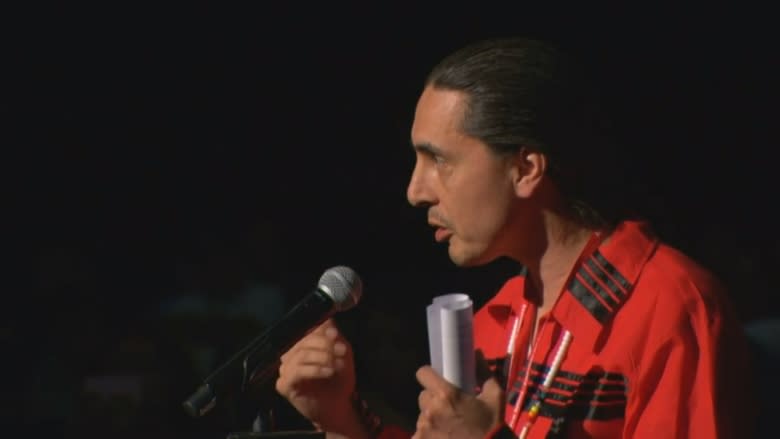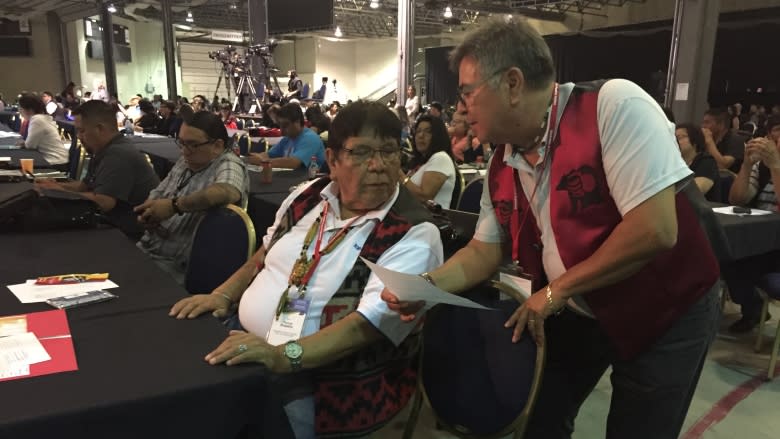The AFN meetings are over, now where does the work begin?
The annual meeting of the Assembly of First Nations is over, and now the work of lobbying for change begins anew for the country's largest First Nations political organization.
The challenge, perhaps, is where to begin.
The AFN, which represents 634 chiefs, wrapped up its three-day annual gathering in Regina on Thursday. It was attended by a record of over 2,000 delegates — 320 of them chiefs or their proxies.
Held twice a year, the meeting is where chiefs seek support from colleagues for the challenges they face in their territories. It's also where they give marching orders to the national chief and the 10 regional chiefs on the AFN's executive committee.
"Lots of work has to happen out in our regions, and our territories and ancestral lands," said National Chief Perry Bellegarde in his closing speech Thursday.
"Working on languages, on treaties, on fiscal, on education, on health, all those things we talked about."
It seems a monumental task, given the sheer breadth of the concerns.
Marching orders
The national chief and the executive receive their marching orders in the form of resolutions, which are written by individual chiefs and voted on at the assembly. Even though some are titled "emergency" resolutions, such as one that called for the AFN to seek immediate help for B.C. First Nations devastated by wildfires, it's unclear whether they're the ones leadership will act on first.
Also, the business of first sorting through and voting on the resolutions, which sometimes conflict with each other, can be a challenge. On Thursday, two opposing resolutions were introduced — and vigorously debated — about the beleaguered National Inquiry into Missing and Murdered Indigenous Women and Girls.
One resolution, introduced by chiefs in Ontario and Quebec, called for a major redesign at the inquiry and was ultimately accepted by the assembly after several tweaks to wording and additions of items.
The other, which was defeated, was introduced by newly elected Grand Chief Arlen Dumas of the Assembly of Manitoba Chiefs. It called for major changes to the inquiry as well, but it also would have required the AFN to ask Prime Minister Justin Trudeau to replace the inquiry's four commissioners, which many chiefs opposed.
"We have to follow the direction of the chiefs in assembly," Bellegarde said. "Any time there's opposing resolutions, we try to get the sides together to try and find that common ground so that all voices are heard."
Necessary debate
Such debate is necessary, said Chief Bobby Cameron from the Federation of Sovereign Indigenous Nations in Saskatchewan, which hosted the meeting.
"Although we have some disagreements on certain items, [the meeting] still brings us together to meet, discuss, deliberate, collaborate and ultimately make a decision on the various resolutions," Cameron said.
Having the time to discuss and vote on resolutions is a constant challenge, however. The meetings were often hours behind schedule and resolutions were dealt with in rushed marathon sessions.
"I think the time we put towards our communities to bring forward their issues and to explain why it's important is a missing part of this," said Chief Thomas Bressette from the Kettle & Stony Point First Nation in Ontario.
"The dialogue chiefs have with each other is very important and we must learn to communicate more effectively like our ancestors did. It was all about sitting down and making the time, understanding and debating, and knowing how we can help."
High-profile visitors
The AFN gathering also had some high-profile visitors and speakers, including several cabinet ministers.
Justice Minister and Attorney General Jody Wilson-Raybould, Indigenous Affairs Minister Carolyn Bennett, Environment Minister Catherine McKenna and Public Safety Minister Ralph Goodale all addressed the assembly.
Finance Minister Bill Morneau also made an appearance on Thursday.
While the presence of so many in government made some leaders suspicious, for others, it was a sign that their national chief has the ear of Ottawa.
"The national chief is opening the doors that we asked him to," Bressette said. "He's doing his job,"
The chiefs will meet again as a group in December at the annual meeting that traditionally is in Gatineau, Que.



